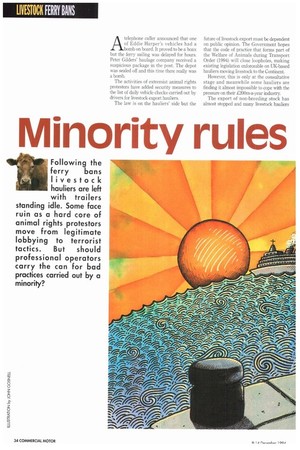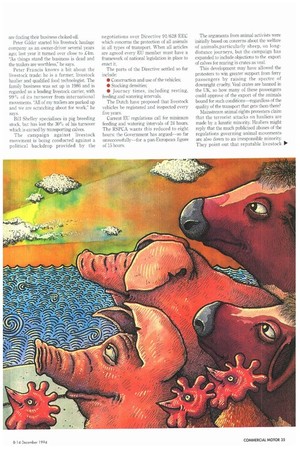Minority rules
Page 36

Page 37

If you've noticed an error in this article please click here to report it so we can fix it.
11 ' Following the ferry bans livestock , hauliers are left
with trailers standing idle. Some face ruin as a hard core of animal rights protestors move from legitimate lobbying to terrorist
tactics. But should professional operators carry the can for bad practices carried out by a minority? Atelephone caller announced that one of Eddie Harper's vehicles had a bomb on board. It proved to be a hoax but the ferry sailing was delayed for hours. Peter Gilders' haulage company received a suspicious package in the post. The depot was sealed off and this time there really was a bomb.
The activities of extremist animal rights protesters have added security measures to the list of daily vehicle checks carried out by drivers for livestock export hauliers.
The law is on the hauliers' side but the future of livestock export must be dependent on public opinion. The Government hopes that the code of practice that forms part of the Welfare of Animals during Transport Order (1994) will close loopholes, making existing legislation enforceable on UK-based hauliers moving livestock to the Continent.
However, this is only at the consultative stage and meanwhile some hauliers are finding it almost impossible to cope with the pressure on their £200m-a-year industry.
The export of non-breeding stock has almost stopped and many livestock hauliers are finding their business choked off.
Peter Gilder started his livestock haulage company as an owner-driver several years ago; last year it turned over close to 14m. "As things stand the business is dead and the trailers are worthless," he says.
Peter Francis knows a bit about the livestock trade: he is a farmer, livestock haulier and qualified food technologist. The family business was set up in 1986 and is regarded as a leading livestock carrier, with 99% of its turnover from international movements. All of my trailers are parked up and we are scratching about for work." he says, Bill Shelley specialises in pig breeding stock, but has lost the 30% of his turnover which is earned by transporting calves.
The campaign against livestock movement is being conducted against a political backdrop provided by the negotiations over Directive 91/628 EEC which concerns the protection of all animals in all types of transport. When all articles are agreed every EU member must have a framework of national legislation in place to enact it.
The parts of the Directive settled so far include: • Construction and use of the vehicles; • Stocking densities; • Journey times, including resting. feeding and watering intervals.
The Dutch have proposed that livestock vehicles be registered and inspected every five years.
Current EU regulations call for minimum feeding and watering intervals of 24 hours. The RSPCA wants this reduced to eight hours: the Government has argued—so far unsuccessfully—for a pan-European figure of 15 hours The arguments from animal activists were initially based on concerns about the welfare of animals,particularly sheep, on longdistance journeys, but the campaign has expanded to include objections to the export of calves for rearing in crates as veal.
This development may have allowed the protesters to win greater support from ferry passengers by raising the spectre of downright cruelty. Veal crates are banned in the UK, so how many of these passengers could approve of the export of the animals bound for such conditions—regardless of the quality of the transport that gets them there?
Mainstream animal rights protesters claim that the terrorist attacks on hauliers are made by a lunatic minority. Hauliers might reply that the much publicised abuses of the regulations governing animal movements are also down to an irresponsible minority They point out that reputable livestock ■
























































































